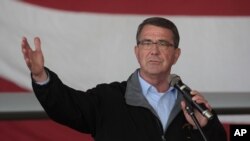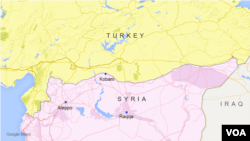During his visit to Turkey this week, U.S. Defense Secretary Ash Carter pressed Ankara to do more to control a 98-kilometer strip along its border with Syria. While Ankara is starting to take steps, questions remain over its commitment to crack down on Islamic State.
Secretary Carter said Turkey has an enormous role to play and that controlling its border is the most important contribution it can make in the war against IS.
Ankara has faced strong pressure from its allies to seal the frontier that borders Syrian territory under IS control.
Earlier this month, Ankara declared the region under emergency rule, a move Semih Idiz, a political columnist with Cumhuriyet newspaper, says signals that international pressure is working.
"It's a change of policy, because there is a lot of pressure from the West, from its [Turkey's] closest allies, [that] this border must be sealed. Turkey sees it has no other option but to do so. But one also can question, 'well, if this was possible to do, why wasn't it done before', and I think many people will be asking [that]," said Idiz.
Russian allegations
After Turkey shot down a Russian warplane along the Syrian-Turkish border late last month, Russian defense officials presented what they claimed was proof that Turkey is involved in illegal oil trade with IS. They also accused - without offering evidence - top Turkish officials, including President Recep Tayyip Erdogan and members of his family, of complicity in that trade.
Erdogan dismissed the allegations as "slander," but President Vladimir Putin subsequently claimed that "industrial volumes" of oil from Syrian oil fields controlled by IS and other terrorist groups were entering Turkey, and that the Russian plane was shot down to protect "the security of these oil supply routes to Turkey."
The United States has dismissed the Russian allegations of Turkish government complicity in trading IS oil. However, top U.S. officials have said Turkey must do more to close a 98-kilometer section of its border with Syria, with President Barack Obama saying that corridor is still being used by IS as "a transit point for foreign fighters" and to ship out "fuel for sale that helps finance their terrorist activities."
Security
Turkish security forces are reported to have stepped up their overall cooperation with their Western counterparts. Earlier this week, a Syrian man was detained after he was suspected of planning a suicide attack on a U.S. diplomatic target in Turkey.
Despite these efforts, Atilla Yesilada, a consultant for Global Source Partners, says questions remain over the ruling AKP party’s commitment to the fight against Islamic State.
"The flow of jihadis and supplies towards ISIS has lessened because of stricter border controls. But nothing has been done to dis-entangle the widespread ISIS network. AKP needs to go after ISIS sympathizers, recruiters and financial aid gatherers in Turkey. I am afraid AKP is unwilling to take that step, [because] it's going to involve, to certain extent, its conservative base," said Yesilada.
Such concerns, observer say, can only add to the debate among Turkey’s Western allies over whether , when it comes to Islamic State, Ankara is part of the solution or part of the problem.





